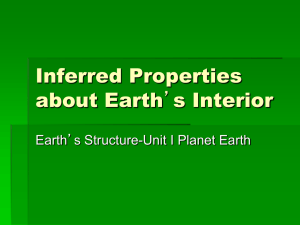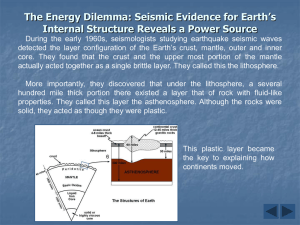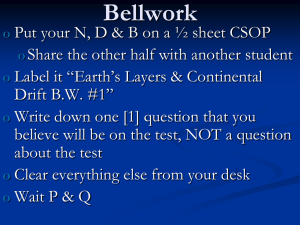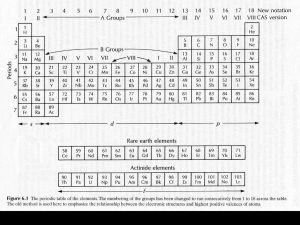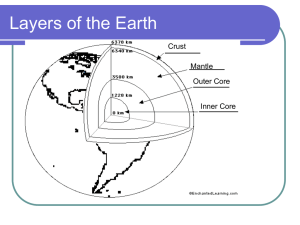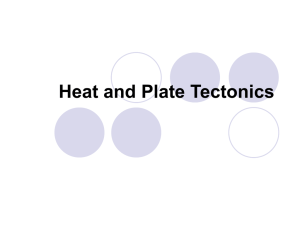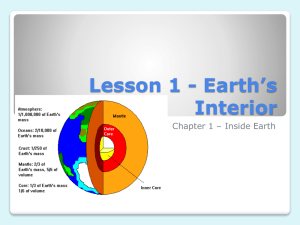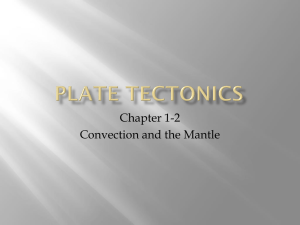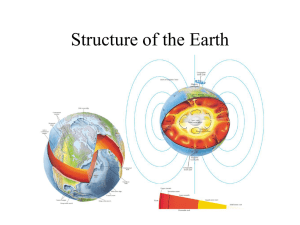PowerPoint Presentation - Environmental Chemistry CH 217
advertisement
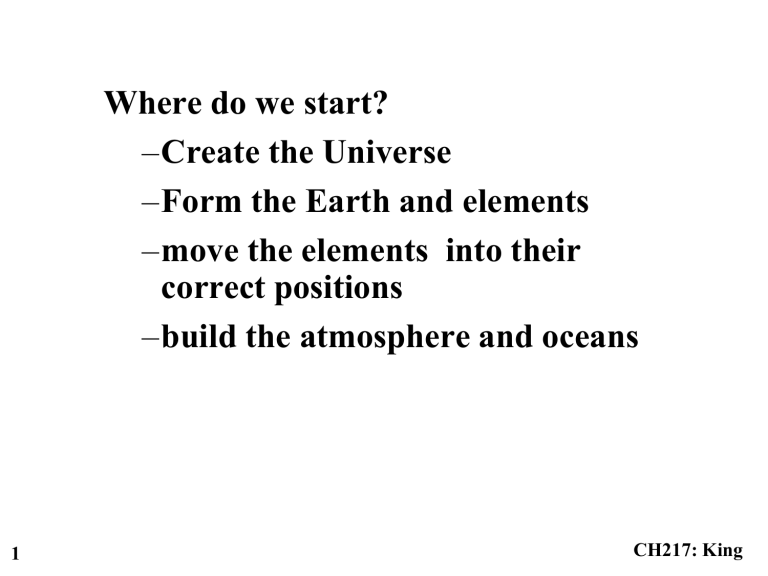
Where do we start? –Create the Universe –Form the Earth and elements –move the elements into their correct positions –build the atmosphere and oceans 1 CH217: King The BIG BANG • The Universe was created 15 billion years ago in one BIG BANG ...... How do we know? • Start with the atom 2 CH217: King ENERGY Nucleus 3 CH217: King } ENERGY E = hv Nucleus 4 CH217: King 5 CH217: King 400 nm Wavelength 700 nm Elemental Absorption • Every element has a characteristic absorption spectra - (ICP) 6 CH217: King Spectrum of the Sun http://images.encarta.msn.com/xrefmedia/aencmed/targets/illus/ilt/T014334A.gif 7 CH217: King 700 nm Wavelength • From the magnitude of the shift we can calculate the speed of the star. • The more distant stars are moving the fastest. • From distance and velocity information -> TIME 15 billion years! 400 nm 8 CH217: King At the Start Big Blob of Neutrons (N) BANG Protons and electrons 12 Minutes 1 1H 9 and -10e CH217: King 1. Cloud of protons and electrons 2. Fusion of Protons: 1 1H 4 11H + 2-10e Þ 42 He + 6 g and -10e Now we are COOKING ........... Fusion produces heat E = mc2 1 gram of hydrogen will produce 6.3x1011 j of heat. Enough heat to boil 2 million liters of H2O Compare this to our terrestrial energy consumption. 10 CH217: King 1. Cloud of protons and electrons 2. Fusion of Protons: 1 1H 4 11H + 2-10e Þ 42 He + 6 g and -10e 3. Fusion of Helium nuclei : 4 2 He + 42 He Û 8 4 Be 8 4 Be + 42 He Û 12 6C 12 C 6 Be 11 + 42 He Û 16 8O + g + g CH217: King 1. Cloud of protons and electrons 2. Fusion of Protons: 1 1H 4 11H + 2-10e Þ 42 He + 6 g and -10e 4. Fusion of carbon nuclei : 23 11Na 12 6C + 12 6C 20 10 Ne 24 12 Mg + 1 1H + 4 2 He +g • This process stops at iron-56 12 3. Fusion of Helium nuclei : 4 2 He + 42 He Û 8 4 Be 8 4 Be + 42 He Û 12 6C 12 6 Be + 42 He Û 16 8O + g + g CH217: King Supernovae Second Generation Star Elements H-1 through Fe-56 Explosion 13 H through Fe and n CH217: King Supernovae Second Generation Star Elements H-1 through Fe-56 H through Fe and n Explosion 0 e Þ 4 He 41 H + 2 1 -1 2 1H + 12 C Þ 13 C + 1 6 6 + 4g 0b + 1 13C + 4 He Þ 16 O + 1n 6 2 8 0 56 Fe + 1n Þ 57 Co + 0b 26 0 27 -1 14 CH217: King 15 CH217: King Beta Decay Proton Number 8 e14N 7 14C 6 5 6 7 8 9 Neutron Number 16 CH217: King Electron Capture Proton Number 20 e19 40K 18 17 20 40Ar 21 22 23 Neutron Number 17 CH217: King Alpha Decay Proton Number 147 146 238U 145 4He 144 143 234Th 89 90 91 92 93 Neutron Number 18 CH217: King 19 CH217: King Review of Element Formation • • • • 20 Big Bang Nuclear “Cooking” - Fusion Neutron Capture What is the end result? CH217: King 21 CH217: King 22 CH217: King 23 CH217: King What about the Earth? 24 CH217: King Another look at the earth on a linear scale. • Where did all the other elements go? H, He, C, N?? They got BLOWN AWAY This leaves just Si, Mg, Fe, and O 25 CH217: King .....and just for fun 26 CH217: King Formation of the Earth • The earth started as a hot molten blob of metal and oxygen • As the blob cooled, density differences of the original components drove an elemental segregation. • Metallic iron - The Earth’s core • Mg, Fe, and Si oxides - The crust • How do we know? • We know from earthquake seismology 27 CH217: King A Slice of the Earth Inner Core Outer Core Mantle 28 CH217: King A Slice of the Earth Inner Core Outer Core 2900 km Mantle 29 • earthquakes travel as shear waves or compressional waves CH217: King • shear waves only pass through SOLIDS (mantle) • So we have a “liquid” iron core. This has important implications for other elements – Ni, S, Au, Pt, Ag, Pb dissolve in the liquid iron • What is left is Mg, Si oxide mantle. • The mantle is not really solid, but really a “putty” that is kept warm by the radioactive decay of 40K, 235U, 238U, and 232Th. • The heating of the mantle drives convection cells. 30 CH217: King Crust Lower Mantle Outer Core Inner Core • The mantle melt cycle (subduction/formation) enriches the crust further in Si, Na, K, Ca, and Al 31 CH217: King What about the Oceans and the Atmosphere? • The Earth is about 0.5% water. Where did it come from? • The source of water in the early Earth is poorly understood ...we are lucky that it arrived. • The gravitational attraction of the Earth retained almost all of the water. • Surface water puts important constraints on global temperature! 0 <--> 100 oC. 32 CH217: King Controls on CO2 • CO2 is controlled by a global scale feedback loop with a time scale of >10,000 years • Consider the following reactions: 33 CH217: King Controls on CO2 • CO2 is controlled by a global scale feedback loop with a time scale of >10,000 years • Consider the following reactions: Generic Weathering Reaction CaSiO 3 (Wollastonite) 3H 2O + 2CO 2 + CaSiO 3 Þ Ca 2+ + 2HCO -3 + H 4SiO 4 Foraminifera (bugs) Generic Precipitation Reactions Ca 2+ + 2HCO -3 Þ CaCO 3 + CO 2 + H 2 O Diatoms (more bugs) H 4SiO 4 Þ SiO 2 + H 2O CaCO3 + SiO 2 Þ CaSiO 3 34 + CO2 Generic Mantle Reactions CH217: King Atmosphere 3H 2 O + 2CO 2 + CaSiO 3 Þ Ca 2+ + 2HCO-3 + H 4 SiO 4 CaSiO 3 Ca 2 + + 2HCO -3 Þ CaCO 3 + CO 2 + H 2 O H 4SiO 4 Þ SiO2 + H 2 O Oceanic Crust Continental Crust CaCO 3 + SiO 2 Þ CaSiO 3 35 + CO2 CH217: King Lets work with units CO2 (g) 0.0365 %, This is a mixing ratio O2 20.95% N2 78.08% Ar 0.93% PV= nRT, average mass gas 28.96 g/mol %, 00/0, ppm, ppb 36 CH217: King Pressure Atmospheric Pressure is a force: kg/m2 P0 = Mass(atm g)/4(pi)r2 r = 6.37x106 m P0 = 101325 Pa Ph = Po e -Mgh/RT æ Mgö Ph ln( o ) = -ç ÷h è RT ø P 37 M = 0.029 kg/mol R = 8.314 J/mol K g = 9.81 m/s2 Scale height 5-6 km CH217: King Unit Conversion 38 CH217: King
